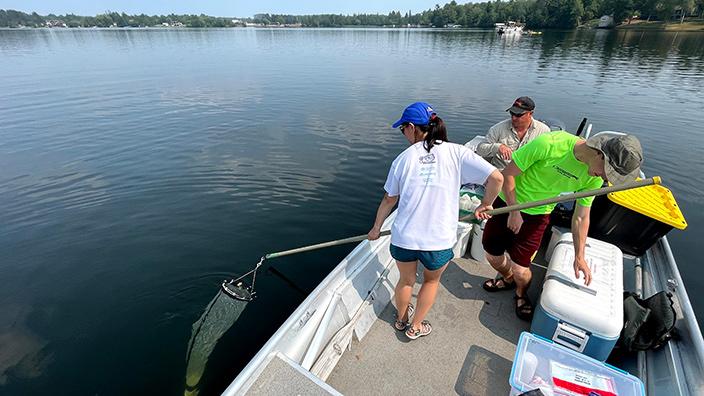Featured Services

Program Overview
We believe that humans can live sustainably with our aquatic resources, ensuring plentiful clean water for future human generations while also supporting the ecosystems that we value and that support our recreation, businesses, and industries. Our teams develop tools and techniques that help society move into this sustainable future, characterizing, measuring and documenting the improvements made along the way. We also provide research, methods development, new technologies, and analysis services to support this vision and our clients.
Program Goals
Develop science-based tools, materials and technologies to assess and protect our water resources, and restore them if degraded.
Unique Strengths, Expertise and Capabilities
Our interdisciplinary team of experts in data science and the fundamental biological and chemical aquatic sciences work together to develop various applications for natural and engineered aquatic systems, including aquatic ecosystem restoration, water treatment and remediation, and water quality monitoring and management. By incorporating an understanding of natural environmental processes, science and engineering fundamentals, we apply a systems-based approach to develop holistic solutions to pressing environmental problems.
Research Labs
- Freshwater Ecosystem Research and Monitoring Lab: Faunal AIS, fish, aquatic macroinvertebrates, zooplankton research
- Lake and Stream Ecosystem Ecology Lab: State-certified water chemistry analyses
- Environmental Microbiology and Biotechnology Lab: Microbial solutions to environmental pollution
- Environmental Chemistry Lab: Researching contamination solutions
- Phytoplankton and Paleolimnology Lab: Using algae to indicate environmental conditions
- Water Treatment Pilot lab: Beneficial reuse of waste materials
Featured Video
Staff
Related News

For 30-plus years, the Central Analytical Lab has informed research and agency monitoring programs with the highest standards of quality.

NRRI completes field study of environmental impact of road salt alternative, starts lab study of grit alternatives.

Love of outdoors keeps field work at the core of research technician’s role.

The U.S. Environmental Protection Agency awarded $3 million to NRRI in June to fund monitoring of the bottom of the food chain in the Great Lakes.

Aquatic ecologist’s career wades into streams and shorelines to understand freshwater resources

NRRI Researcher 3: Environmental Chemistry
Job Opening: 346384
Supervisor: Bridget Ulrich
Open until filled

NRRI Post-Doctoral Associate (9546)
Job Opening: 345517
Supervisor: Chan Lan Chun
This position will remain opened until filled

Collecting the eDNA of invasive species informs prevalence and spread in Northern Minnesota lakes

NRRI receives $2.33M from the EPA to support research teams that monitor shorelines from Thunder Bay to Green Bay.
Media Coverage
- – UMD researchers tackle how to remove invasive species inside boats – Duluth News Tribune
- – Green Visions: St. Louis River Estuary Algal Blooms – WDSE The North Radio
- – Study: Wildfire led to poorer water quality in northern Minnesota lakes – MPR News
- – New study reveals Greenwood fire’s impact on nearby lakes – Northern News Now
- – How does a forest wildfire affect water quality? – Quetico Superior Wilderness News
- – Researchers study water quality impacts following 2021 Greenwood Fire – WTIP
- – Wildfires contribute to nutrient-rich, murky water in lakes – Phys Org
- – Wildfires contribute to nutrient-rich, murky water in lakes – University of Minnesota Research Brief
- – ‘Rock snot’ continues to threaten biodiversity in many North Shore rivers and streams – WTIP
- – Wetlands were everywhere on the Great Lakes, how one project is helping save them – Milwaukee Journal Sentinal
- – Researchers in Duluth turn streams purple to help measure effectiveness of restoration – MPR News
- – Researchers studying restoration at Mission Creek using new dye technique – WDIO
- – St. Louis River water quality project launched by NRRI, others – Hometown Focus
- – New Grant To Increase Water Quality Monitoring in St. Louis River Estuary – Fox 21 Local News
- – Northern Minnesota researchers close in on sulfate pollution solution – MPR News
- – What is Blue-Green Algae? A Conversation with Dr. Chris Filstrup from NRRI – KAXE radio
- – UMD scientists study phytoplankton, the base of Great Lakes food chain – Duluth News Tribune
- – Duluth-based scientists get $3 million grant to study Great Lakes' phytoplankton – Star Tribune
- – Scientists get grant to monitor bottom of Great Lakes food chain – WDIO
- – Damming research: Study finds beavers might not be all bad for trout streams – Duluth News Tribune
- – Scientists using DNA to track invasive species – Duluth News Tribune
























